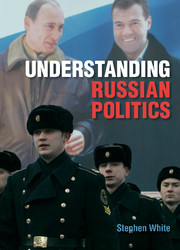Book contents
- Frontmatter
- Contents
- List of figures
- List of tables
- Preface
- Map: administrative units under the 1993 Constitution
- 1 From communist to postcommunist rule
- 2 Voters, parties and parliament
- 3 Presidential government
- 4 From plan to market
- 5 A divided society
- 6 Changing times, changing values
- 7 Russia and the wider world
- 8 What kind of system?
- Notes
- A Note on surveys
- Index
- References
4 - From plan to market
Published online by Cambridge University Press: 05 June 2012
- Frontmatter
- Contents
- List of figures
- List of tables
- Preface
- Map: administrative units under the 1993 Constitution
- 1 From communist to postcommunist rule
- 2 Voters, parties and parliament
- 3 Presidential government
- 4 From plan to market
- 5 A divided society
- 6 Changing times, changing values
- 7 Russia and the wider world
- 8 What kind of system?
- Notes
- A Note on surveys
- Index
- References
Summary
The Soviet economy had achieved unprecedented rates of growth, but performance steadily deteriorated, and by the Gorbachev years it was in what the leader himself described as a ‘crisis situation’. Under his leadership, tentative steps were taken towards private ownership and the market; much more decisive steps were taken by Boris Yeltsin after 1991, especially through a far-reaching privatisation of state property. The economy, however, continued to contract, and the currency itself collapsed in a ‘default’ in 1998 that, for many Russians, discredited the strategy he had been pursuing. Putin placed a much greater emphasis on state ownership and management, and higher oil prices allowed the economy to grow rapidly throughout the years of his presidency; output fell again during the international financial crisis that began in late 2008, but soon recovered. It remained unclear how long a strategy could be sustained that depended so heavily on the export of raw materials, and there were deepening problems of corruption and the rule of law that prejudiced the strategy of ‘modernisation’ to which the Medvedev leadership was publicly committed.
Lenin, in one of his later writings, had insisted that socialism would prevail ‘in the long run’ because of the greater productivity that was inherent in a system whose only purpose was the satisfaction of human requirements. In the end it was capitalism that prevailed, and it appeared to have done so, more than anything else, because of its ability to secure a greater return from the resources it commanded and, as a result, to provide a higher level of human welfare.
- Type
- Chapter
- Information
- Understanding Russian Politics , pp. 115 - 162Publisher: Cambridge University PressPrint publication year: 2011



